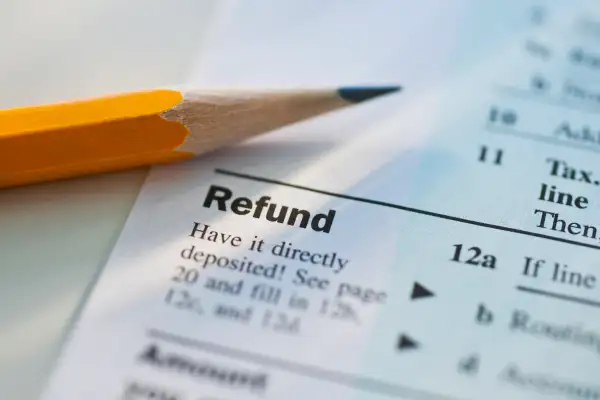Getting Your Tax Refund May Take Way Longer Than Usual This Year

Tax season is scheduled to officially begin on Jan. 24. And according to the Taxpayer Advocate Service, an independent watchdog and advocacy group within the IRS, "the outlook for the upcoming filing season is bleak."
The comments came in the group's annual report to Congress, released by its head, National Taxpayer Advocate Erin M. Collins, on Wednesday. While she acknowledged the quick work the IRS did last year with child tax credit and stimulus check payments, she did not sugarcoat the agency's shortcomings. Collins described 2021 as "the most challenging year taxpayers and tax professionals have ever experienced."
Even now, the IRS is still dealing with millions of 2021 tax returns, unprocessed forms and unanswered customer service requests. It's scrambling to deal with pandemic programs like stimulus checks and advance child tax credit payments. It's underfunded and overwhelmed. And there's a good chance all of that will lead to further chaos.
The backlog of returns and the IRS's meager budget are among the many factors that are likely to "negatively impact the 2022 filing season," according to the report.
Case in point: The IRS is struggling to cope with the "historic" level of calls from confused taxpayers. Last year, only 11% of the 282 million phone calls the IRS received were answered by representatives.
Even more alarming: The report used the word "delay" 277 times. In fact, it said, "the unprecedented processing and refund delays taxpayers experienced in 2021 could be as bad, and potentially worse, in 2022" if certain improvements aren't made.
How to avoid tax refund delays in 2022
You don't necessarily need to panic. Many tax returns and refunds sailed through the IRS system without incident last year. The issue is that the ones didn't really didn't.
Usually, the IRS issues 90% of refunds within 21 days of receiving someone's tax return. But as of Dec. 23, the IRS had 6 million unprocessed individual returns; for those with errors or that require special handling by IRS employees, refunds can take up to 120 days, according to the agency. More than 2 million amended returns are still clearing, too, which can take more than 20 weeks.
Collins recommended a slew of solutions, and obviously the IRS is trying to get back up to speed as best it can. Commissioner Chuck Rettig said in a recent news release that "IRS teams have been working non-stop these past several months to prepare."
But there are steps you can take to maximize your chances of receiving your refund in a timely manner.
First, file your taxes electronically (if you can). Last year, the IRS got more than 17 million individual income tax returns on paper, some of which took the agency "at least eight months" to process, according to the report.
Depending on your income level, you may be eligible to take advantage of the IRS Free File program, which allows Americans to file their federal taxes for free using an online tax prep service. The Tax Day deadline is April 18 for most people this year, and the sooner you file, the sooner you can (theoretically) get your tax refund.
Second, check your numbers. Math errors take the IRS time to resolve. The report specifically highlights how people who don't properly reconcile items like their third stimulus checks and advance child tax credit payments could encounter delays.
To do this, you'll want to look out for Letters 6475 and 6419 from the IRS, which are being mailed now. They'll display how much money you received and provide guidance on how to claim credits for any funds you believe you're still owed.
Third, opt in to direct deposit. Taxpayers with direct deposit information on file with the IRS typically get their refunds faster than those who must wait for paper checks in the mail. It's safe, and you can divide your refund among accounts if you like. Plus, it'll help with any future stimulus checks and/or child tax credit payments you're due.
More from Money:
The IRS Is Sending Out Letters About Stimulus Checks to Millions of Taxpayers This Month
2022 Tax Brackets: How Record-Breaking Inflation Will Affect Your Taxes

